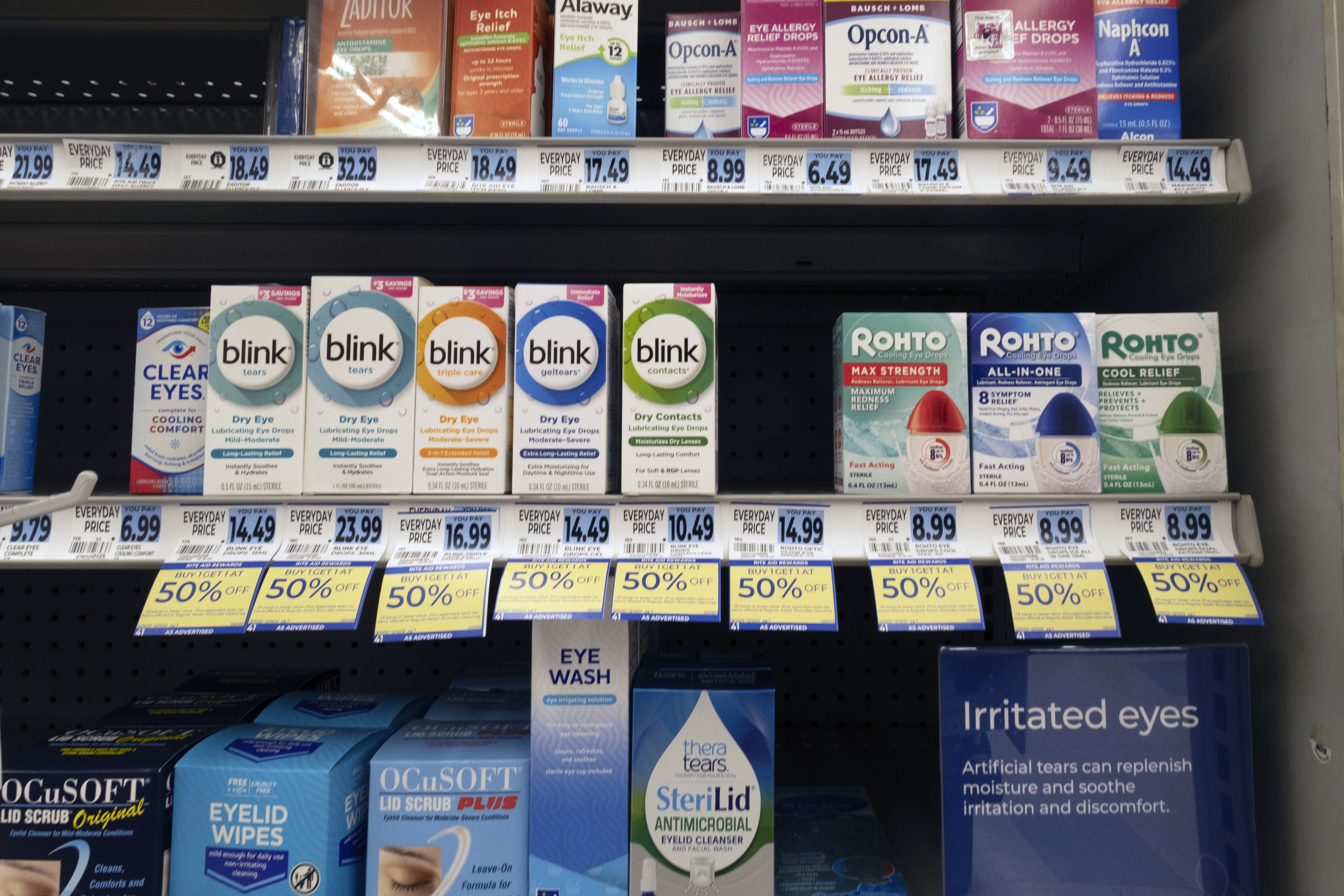
WASHINGTON — While you purchase eyedrops at a U.S. retailer, you would possibly assume you are getting a product made in a clear, well-maintained manufacturing unit that’s handed muster with well being regulators.
However repeated recollects involving over-the-counter drops are drawing new consideration to simply how little U.S. officers know concerning the situations at some manufacturing vegetation on the opposite aspect of the world—and the restricted instruments they must intervene when there’s an issue.
The Meals and Drug Administration is asking Congress for brand new powers, together with the power to mandate drug recollects and require eyedrop makers to bear inspections earlier than transport merchandise to the U.S. However specialists say these capabilities will do little with out extra workers and sources for international inspections, which have been a problem even earlier than the COVID-19 pandemic compelled regulators to skip 1000’s of visits.
“The FDA shouldn’t be getting its job finished when it comes to drug high quality assurance inspections overseas,” mentioned David Ridley of Duke College and co-author of a latest paper monitoring the downturn in inspections. “Only a few international drugmakers have been inspected prior to now 4 years.”
In 2022, FDA international inspections have been down 79% from 2019, based on company information collected by Ridley’s group. Inspections elevated this yr however are nonetheless far under pre-pandemic ranges.
FDA spokesman Jeremy Kahn mentioned: “The FDA works to examine as many services doable, however in the end trade is chargeable for the standard of their merchandise.”
An October recall of two dozen eyedrop manufacturers got here after FDA workers discovered cracked flooring, barefoot employees and different unsanitary situations at a Mumbai plant that provided merchandise to CVS, Walmart and different main retailers. It was the primary time FDA workers had visited the positioning.
That inspection was prompted by an earlier recall of tainted eyedrops from a distinct Indian plant that is been linked to 4 deaths and greater than a dozen circumstances of imaginative and prescient loss. That plant had additionally by no means been beforehand inspected.
“These are very uncommon cases, however what we’ve seen is that these merchandise may cause actual hurt,” mentioned Dr. Timothy Janetos, an ophthalmologist at Northwestern College. “One thing wants to alter.”
Consultants level to 3 doable adjustments:
Earlier inspections
Prescription medicines are extremely regulated. Earlier than a drugmaker can promote one within the U.S., it should bear FDA evaluate to determine its security and effectiveness. As a part of the method, the FDA usually inspects the manufacturing unit the place the drug will likely be made.
However eyedrops and different over-the-counter merchandise don’t bear preliminary evaluate or inspections. As a substitute, they’re ruled by a distinct system known as a monograph, primarily a generic recipe for all medicines in a specific class. As long as drugmakers attest that they’re utilizing the usual recipe, they’ll launch a product inside days of submitting with the FDA.
“It’s nothing greater than digital paperwork,” mentioned Dr. Sandra Brown of the Dry Eye Basis, a nonprofit advocating for elevated regulation. “There’s no requirement for the ability to be inspected previous to transport on the market.”
The FDA says it has flexibility to regulate its evaluate course of “to make sure security.”
However the company is asking Congress for the facility to require producers of eyedrops and different sterile merchandise to provide a minimum of six months discover earlier than transport merchandise from a brand new manufacturing unit. That will give inspectors time to go to services that aren’t on their radar.
The proposal might face pushback from some over-the-counter drugmakers, who aren’t accustomed to preapproval inspections.
However Brown says the distinctive dangers of tainted eyedrops require a distinct strategy from capsules and tablets.
“Something you swallow goes to fulfill up along with your abdomen acid, which goes to kill most micro organism,” Brown mentioned. “It’s way more harmful to place a product in your eye.”
Requiring recollects
The FDA warned customers in late October to not use the eyedrops bought at CVS, Ceremony-Support and different shops. However the merchandise weren’t formally recalled till Nov. 15, virtually three weeks later.
That is as a result of Indian producer, Kilitch Healthcare, initially declined to cooperate. The FDA can power recollects of meals, medical units and plenty of different merchandise, but it surely lacks the identical authority for medication and as an alternative should ask firms to voluntarily take motion.
The FDA not too long ago requested Congress for obligatory recall authority over medication.
Funding international inspectors
Because the 1990s, drug manufacturing has more and more moved to India, China and different lower-cost nations.
The Authorities Accountability Workplace has raised considerations for years concerning the FDA’s oversight of the worldwide provide chain, flagging it as a “high-risk” challenge for greater than a decade.
The FDA mentioned in an announcement it makes use of “all out there instruments” to make sure Individuals get “top quality, protected and efficient” drugs.
The company typically prioritizes factories which have by no means been inspected or haven’t been inspected within the final 5 years. It halted most routine, in-person international inspections in March 2020 and didn’t resume them till 2022. The company didn’t conduct any inspections in India through the first yr of COVID-19.
FDA leaders have lengthy mentioned it is difficult to recruit and preserve abroad inspectors.
Consultants say Congress can and will handle that.
“Federal hiring is inherently sluggish and pay is usually not aggressive,” mentioned Ridley, the Duke researcher. ”Congress must try to assist FDA resolve that downside after which maintain them chargeable for staffing inspections.”
Extra Should-Reads From TIME



